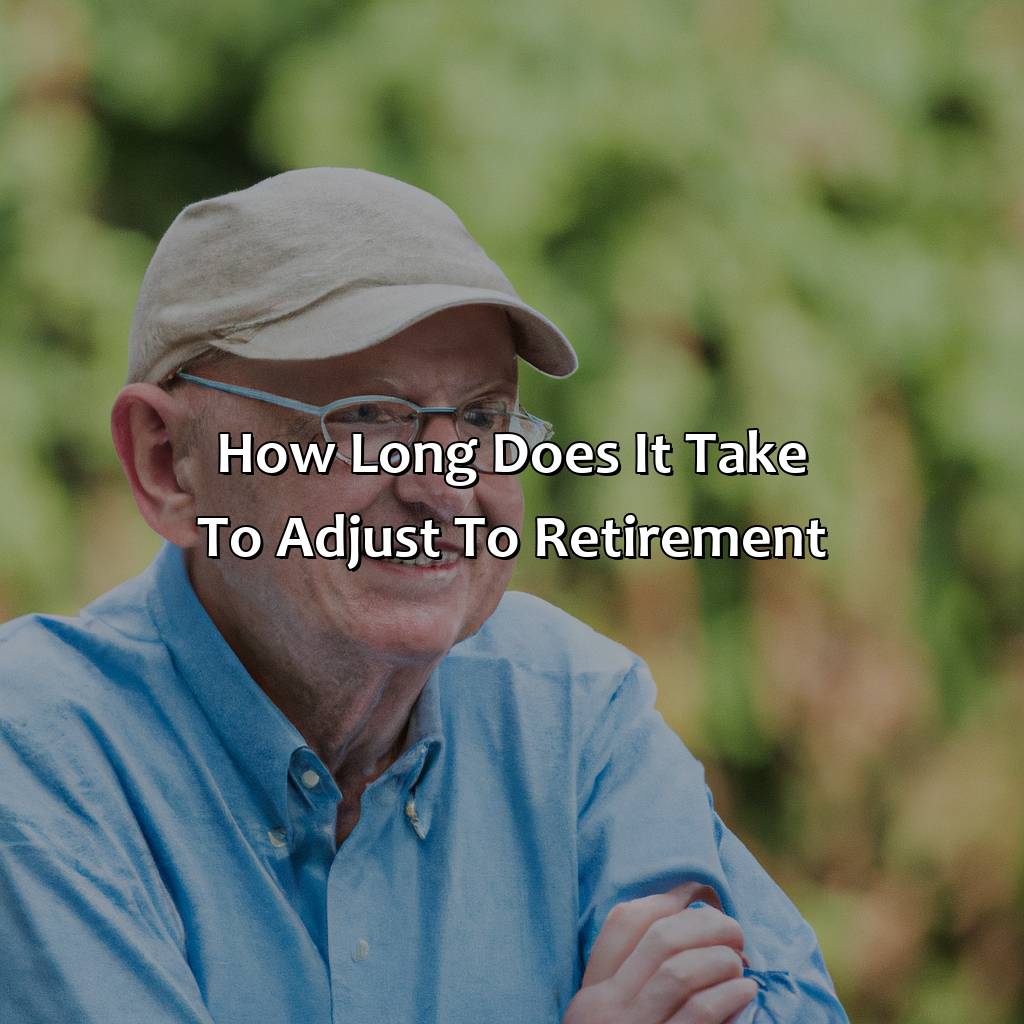How Long Does It Take To Adjust To Retirement?
Key Takeaways:
- The initial retirement period can be challenging, but coping mechanisms such as staying active and considering part-time work can help ease the transition.
- Emotional adjustment to retirement can be affected by various factors, such as health and finances. Coping with emotional challenges may involve seeking support from friends and family or professional counseling.
- Finding purpose in retirement through exploring new hobbies, volunteering, and maintaining social connections can lead to a happier and fulfilling retirement.
Feeling overwhelmed with retirement? You are not alone. Retirement can be a difficult adjustment. It’s important to understand what to expect and how to navigate this major life change. Learn how to settle into a successful retirement today.
Adjusting to Retirement
Retirement Adjustment – How Long Does It Take?
Retirement adjustment can be a challenging process for many individuals. It involves transitioning from a structured work environment to a life of more freedom and choices. Adjusting to retirement can take anywhere from six months to two years or more. During this period, retirees may experience a range of emotions, including boredom, anxiety, and a sense of loss.
Retirees must learn to fill their days with meaningful activities, build new social networks, and establish new routines. Retirement adjustment can also depend on a range of factors, including financial security, health status, and personal goals. It is a unique and individualized process.
A study by the Transamerica Center for Retirement Studies found that 73% of retirees say they are enjoying retirement. However, retirement adjustment can still take time and effort. Retirees must be patient with themselves and seek support when needed.
According to the Department of Health and Human Services, retirement can introduce health benefits such as reduced risk of depression, heart disease, and stroke. Retirees can also lead a fulfilling life by volunteering, pursuing hobbies, and traveling. Retirement adjustment may have its ups and downs, but with the right mindset and planning, it can be a rewarding experience.

Image credits: retiregenz.com by David Arnold
The Initial Retirement Period
For a smooth transition to retirement, it is essential to have coping mechanisms and strategies. This period can be hard, especially when it’s tough to let go of work. Here, we’ll discuss helpful tips for coping and how to move forward, leaving work behind.

Image credits: retiregenz.com by David Woodhock
Coping Mechanisms During the Initial Period
Retirement Adjustment Techniques During the Initial Phase
Retiring may bring mixed feelings, and adjusting to a new routine can be difficult. To cope during this initial phase, retirees should seek social connections, exercise, maintain a regular schedule and practice mindfulness techniques.
- Connecting with loved ones or finding a social club for hobbies is vital to prevent isolation and loneliness.
- Incorporating physical activity daily can help boost mood, energy level and mental wellbeing.
- Having a structured schedule can provide routine and a sense of purpose.
- Practicing mindfulness meditation or engaging in mindful activities like gardening or reading helps manage stress levels effectively.
In summary, keeping a positive outlook towards retirement transition enables one to adapt better mentally and handle emotional changes proactively.
“To sum up, transitioning into retirement poses challenges that require early preparations, but with practical coping mechanisms in place, retirees will adjust successfully to retirement.”
“I tried to retire from my job, but my inbox kept pulling me back in like a black hole of unfinished tasks.”
Difficulty Letting Go of Work
For some individuals, there may be a reluctance to disassociate from their professional identity once they retire. This struggle with transitioning from a career-oriented mindset to a more leisurely approach of retirement could lead to difficulties in letting go of work.
The inability to easily let go of work could lead to negative feelings like sadness, anxiety, and diminished self-worth as it becomes impossible to perform certain duties associated with one’s profession. For instance, not having the power to make upcoming decisions in the company.
It is also critical to acknowledge that this transitional period affects people differently; some may discover that it takes longer for them to adjust than others. It’s crucial for retirees or soon-to-be-retired professionals to seek support and guidance as they navigate through this time.
One individual who faced difficulties in letting go of work was Sarah. To help her with the transition period, she arranged for a group of former colleagues whom she met monthly for lunch, and she utilized resources provided by her employer’s retirement benefits package. Over time Sarah learned how to maintain an everlasting connection with her prior role while still enjoying the new journey of retirement life.
Retirement means never having to set an alarm clock, but it also means realizing that you no longer have a reason to.
Emotional Adjustment to Retirement
Retirement brings a fresh set of emotions, from relief to worry. To help you adjust emotionally, this section will consider:
- Factors Affecting Emotional Adjustment
- Coping with Emotional Challenges
Discover what impacts your emotional adjustment and learn how to handle any struggles.

Image credits: retiregenz.com by Harry Duncun
Factors Affecting Emotional Adjustment
The variables impacting emotional adaptation after retiring are multifaceted and unique to every individual. Not everybody goes through the same sequence of emotions or speeds up the method of adjustment at the same pace as others. literal meaning terms that impact emotional adaptation may be determined by psychological, social, cultural, economic, or biological factors or a combination of these variables. Coping mechanisms, ethnicity, sex, income status, marital condition, personal motivation and sense of purpose in life and pre-retirement functioning influence how one adjusts to retirement.
Adapting to retirement also depends on mental well-being. Those older individuals who show greater resilience and integration abilities can adjust quicker than their more anxious counterparts overwhelmed with regret regarding unfulfillment towards life goals left behind after retiring. Even for some people, it may take weeks or months to adapt completely to new routine-free lifestyle away from typical workday responsibilities. A supportive group with similar interests or connecting oneself as a volunteer in community-based organizations can help more successful adjustment.
Retirement is just like a rollercoaster, except the dips last longer and the screams are from missing your daily routine.
Coping with Emotional Challenges
Emotional Resilience During Retirement: Tips for Overcoming the Challenges
Retirement can usher in a new chapter of life, marked by more leisure time, rest and reflection. However, this can often come with emotional challenges-emphasized by identity loss, loneliness, anxiety, and even depression. Adjusting to the new phase of life may take some time, emotionally as well as financially. Maintaining an active lifestyle and building strong relationships can bring about a sense of purpose and personal fulfillment.
It’s natural to feel uncertain or apprehensive about retirement; yet it is important not to overlook the positive aspects or the opportunity for growth. Many seniors fear missing out on social events or experiences that they had become accustomed to before retiring. With a solid support system in place and engaging in fulfilling activities of interest, retirees can find that this period of their lives is just as rewarding as any other.
Retirement: the perfect time to finally pursue your lifelong dream of napping whenever you damn well please.
Finding Purpose in Retirement
Discover purpose in retirement! How long does it take to adjust? Try new hobbies. Explore interests. Volunteer or join the community. Look at the benefits of each topic. Fill the void of retirement. Find newfound meaning in life.

Image credits: retiregenz.com by Joel Arnold
Exploring New Hobbies and Interests
Engaging in Novel Interests and Pursuits
Exploring new activities can be an effective way of adjusting to retirement. By trying out diverse pastimes, retirees can discover hidden passions and talents they never knew existed. This rejuvenates the mind, body and soul and offers a sense of purpose.
Additionally, picking up new skills through hobbies like learning a new language or musical instrument can improve cognitive abilities while providing a meaningful source of entertainment. It is always recommended to start with simple hobbies and gradually progress towards more complex ones to experience them fully.
Pro Tip: Don’t shy away from exploring outdoor activities such as hiking, gardening or even bird-watching – these not only provide physical exercise but also allow for the enjoyment of nature’s scenic beauty.
Retirement may mean never having to work again, but volunteering can make you feel like you’re actually doing something with your life.
Volunteering and Community Engagement
Volunteering and Social Involvement are Essential
Maintaining social connections improves mental and physical health. Volunteering in your community can boost self-esteem, enhance empathy, and decrease isolation.
- Joining a club or group enhances a sense of belonging
- Providing services for others boosts confidence
- Interacting with diverse individuals stimulates personal growth
It’s important to stay active even post-retirement. Finding meaningful ways to engage socially can benefit overall well-being.
Individuals who find purpose and fulfillment often feel more content in their daily lives. For instance, offering mentorship to young adults or participating in environmental clean-up efforts can generate a sense of satisfaction.
After retirement, one may feel lost or bored but finding a valuable outlet like volunteering, enables one to connect with society while making a profound impact within communities.
Retirement may mean no more water-cooler talk, but thankfully there’s always Facebook to remind you why you retired in the first place.
Maintaining Connections After Retirement
The title “How long does it take to adjust to retirement?” illustrates the need for social connections. To remain connected after retirement, one must understand the importance of social relationships. Strategies for staying connected include connecting with friends, family, and colleagues. This will help prevent loneliness and isolation. Here, we’ll examine the importance of social connections and give methods to stay connected post-retirement.

Image credits: retiregenz.com by Adam Woodhock
Importance of Social Connections
Maintaining social connections in retirement is crucial for one’s well-being, as it positively impacts mental and physical health. Social connections provide a sense of belonging, purpose, and security to retirees. These connections can be maintained through family, friends, community groups or volunteering, which helps retirees stay active and engaged.
Retirees who maintain social connections have lower levels of stress, anxiety, and depression than those who are socially isolated. Moreover, having a close-knit group of social connections also provides financial benefits in case of emergencies. Research shows that social isolation can be as harmful to health as smoking 15 cigarettes a day.
In addition to regular communication with family and friends, joining community groups or organizations related to personal interests can help build new social connections after retirement. Volunteering not only provides opportunities for retirees to give back to society but also helps them develop new skills and make new friends.
Retirees can maintain their social connections by scheduling regular appointments with friends or family members to catch up over coffee or lunch. They can use technology such as video calls or social media to stay connected with long-distance contacts. Joining local clubs that cater to an individual’s interests helps expand their social circle while providing opportunities for fun leisure activities.
Retirement may mean less work, but it doesn’t have to mean less socializing – time to brush up on your Facebook stalking skills.
Strategies for Staying Connected
Strategies for staying socially active after retirement involve engaging in activities that promote social connections. Participating in local volunteer groups, taking part in educational courses, and joining clubs with shared interests are useful ways of maintaining social interactions. The key is to find activities that match personal interests.
Volunteering helps retirees engage with the broader community while providing a sense of purpose and satisfaction; taking classes allows retirees to meet new people while learning new things. Joining clubs centered around hobbies or leisure activities like gardening, photography, or hiking provides enjoyable experiences that can also increase social connections.
In addition to these strategies, some retirees have found success in utilizing technology like video calls, messaging apps or forums to stay connected with friends, family members, and former colleagues who live far away.
One retiree specifically benefited from joining an online forum for retired workers where they could share their experiences, offer advice and discuss common issues faced during retirement. By connecting with individuals all over the world through this virtual community, they found a new avenue for socialization and support after leaving the workforce.
Retirement might make you financially poor, but it’s the memories and experiences that make you rich.
Financial Adjustment to Retirement
Adjusting financially in retirement? This section will help! It has two sub-sections:
- Budgeting and Managing Expenses
- Retirement Savings and Investments
Each provides info and guidance. Plan wisely and manage your finances efficiently!

Image credits: retiregenz.com by Harry Duncun
Budgeting and Managing Expenses
Managing finances during retirement can be challenging. Adjusting to a new lifestyle requires appropriate budgeting and expense management. It is essential to create a comprehensive financial plan that addresses all aspects of retirement, including healthcare costs, travel expenses, and other unforeseen circumstances.
When budgeting for retirement expenses, it is crucial to account for inflation and cost-of-living adjustments. It may also be necessary to make adjustments to one’s lifestyle, such as downsizing one’s home or reducing entertainment expenses. An effective way to manage expenses is by creating a monthly budget that accounts for all income sources and expenditures.
Aside from proactive steps, individuals may face emotional challenges when adapting to retirement life after decades of working. It takes time to adjust mentally and financially. Therefore it is advisable to seek guidance from professionals such as financial planners or therapists.
John retired last year but continued living the same lavish lifestyle he enjoyed while working. He soon realized he had depleted his savings more quickly than planned and found himself in a bind when unexpected expenses arose. John sought professional advice which helped him develop a realistic budget plan; subsequently regained control of his finances.
Retirement savings – because nothing says ‘living the dream’ like constantly checking your bank balance to make sure you can still afford to eat.
Retirement Savings and Investments
Planning your monetary stability for the future era of your life is crucial for a peaceful retirement. Preparing yourself for the end-of-service benefit and investment diversification is important. The right balance of savings and investments can help you guarantee better financial stability, making sure that you don’t fall short in your golden years.
You must create a long-term plan to secure your retirement funds gradually. A diverse and easy-to-manage investment portfolio is one way to ensure financial security, as it helps provide enough funds through earnings and savings.
Additionally, creating an emergency fund will help cover any unforeseen expenses that may crop up post-retirement. An emergency fund can be useful if unexpected expenses arise such as health-related costs or unexpected home repairs.
Many have found that after retiring, monotonous routine needs to be changed for better physical and mental health. One should explore voluntary work with sufficient remuneration, taking part-time jobs or turning into an entrepreneur by pursuing hobbies as a business endeavour could all lead to fruitful results financially and emotionally
Finally, Mr Peters retired as planned but faced a dilemma as his income could not sustain his lifestyle post-retirement. Mr Peters opted to continue working part-time allowing him more time to enjoy his interests while enjoying extra money in the bank. This decision gave him peace of mind amidst turgid emotions of changeable routines.
Retirement may take time to adjust to, but at least you no longer have to pretend to care about Karen’s weekend plans at the water cooler.
Embracing a New Life Chapter
Entering a New Life Phase entails numerous changes in one’s routine, expectations, and goals. Adjusting to new realities can take time and require emotional resilience. Retirement is one of those comprehensive life transitions that affect one’s identity and relationships. To adapt adequately, retirees require effective self-management skills, social support network, hobbies or volunteer activities, and financial stability. These components help to facilitate a smooth retirement adjustment while maintaining physical and mental well-being.
Retirement is not a linear process; several factors dictate how retired individuals adjust to their post-work life. Some factors include age at retirement, health status, marital status, personality traits, work satisfaction before retirement age, available resources like good pensions or savings options. Moreover, the cultural background of the retiree also affects the duration it takes them to adapt to retirement life entirely.
Studies have shown that retirement disruption may stir substantial stress responses among some individuals. For instance, some retirees suffer from feelings of loss of purpose as they transition into activities that do not give them as much sense accomplishment or productivity – this often leads to reduced motivation levels and energy balance within oneself. In severe cases with no timely intervention by professional therapists or family members’ advice & discussions about these challenges before retiring- prolonged distress can lead even further cognitive decline as people age.
According to the research held by BrightHR named “How long does it take for people to settle into retirement?” It takes an average retiree about 16 months (approx) in total; six months to get over the honeymoon period and ten more months of settling into their new routine fully.”
Five Well-Known Facts About How Long It Takes To Adjust To Retirement:
- ✅ The time it takes to adjust to retirement varies for each individual, but on average it takes around 6-9 months. (Source: Investopedia)
- ✅ Retirement can be an emotional and psychological adjustment, as individuals transition from a structured work routine to newfound freedom. (Source: U.S. News)
- ✅ Maintaining social connections and engaging in meaningful activities can aid in the retirement adjustment process. (Source: Psychology Today)
- ✅ A sense of purpose and fulfillment can also contribute to a positive retirement adjustment. (Source: Forbes)
- ✅ Retirement can also present financial challenges, such as managing retirement savings and adjusting to a fixed income. (Source: AARP)
FAQs about How Long Does It Take To Adjust To Retirement?
How long does it take to adjust to retirement?
Retirement is a significant life transition that can bring a range of emotions and changes. Many people wonder how long it takes to adjust to retirement. However, the adjustment time can vary from person to person.
What are some common challenges retirees face?
Retirees may face several challenges, including a loss of identity, social isolation, and a reduction in income. They may also find it difficult to adjust to a new routine and may struggle to maintain a sense of purpose.
How can I prepare for retirement?
Preparing for retirement can involve multiple steps, including creating a budget, saving for retirement, and developing an idea of how you want to spend your time during retirement. Seeking out resources, such as financial advisors and retirement planning workshops, can also be helpful.
What can I do if I am struggling to adjust to retirement?
If you are having difficulty adjusting to retirement, it may be helpful to seek out counseling or therapy. You can also consider finding new hobbies, volunteering, or socializing with friends and family to combat feelings of isolation or loss of purpose.
Is it normal to feel a sense of loss or sadness after retiring?
Yes, it is entirely normal to feel a sense of loss or sadness after retiring. Retirement represents a significant change in one’s life, which can be difficult to adjust to. However, by seeking out resources and support, retirees can navigate these emotions and find a fulfilling life during retirement.
What are some benefits of retirement?
Retirement can bring several benefits, including having more leisure time to pursue hobbies and interests, improved overall health and well-being, and more time to spend with friends and family. Retirement can also provide the opportunity for a new phase of life and new experiences.





